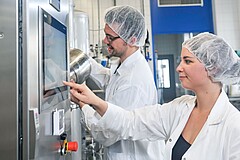FEI Research Funding Summary: University of Hohenheim at the forefront of food research [08.12.23]
University of Hohenheim in first place for food research in Germany / According to the FEI Research Funding Summary, 38 of 210 funded (sub-)projects are based there
A university with cutting-edge food research: 38 of the 210 (sub-)projects funded by the Research Association of the German Food Industry (FEI) are located at the University of Hohenheim. This means first place in Germany with a total of 8.2 million euros in funding. The Technical Universities of Munich and Berlin took second and third place. The ranking can be found in the current Research Funding Summary published by the FEI at its annual conference on September 11, 2024. The ranking of the National Taiwan University (NTU), recently published, also certifies that the University of Hohenheim in Stuttgart has the highest level of research in Germany for the eleventh time in a row. NTU Ranking: For the subject of Agricultural Sciences, the NTU ranking also includes Food Science and Technology, Horticulture, and Nutritional Science and Dietetics.
In order to accelerate the transfer of research findings into practice with cooperation projects, the Research Association of the German Food Industry (FEI) funded a total of 38 (sub-)projects at the University of Hohenheim in 2023 with a total sum of around 8.2 million euros. This makes the University of Hohenheim the leading institute for food research in Germany, ahead of the Technical University of Munich.
In 2023, the FEI supported a total of 210 (sub-)projects at 57 institutes of 36 research institutions to the tune of 46.7 million euros. This is acquired from the funding pots at the Federal Ministry for Economic Affairs and Climate Action (BMWK) and from third-party funds in the industry. FEI projects often consist of two or three sub-projects based at different institutes and facilities. Almost three quarters of these institutions are universities, making them by far the most important research institutions in the field of food research.
Examples of Hohenheim research projects
A large proportion of the Hohenheim projects are located at the Institute of Food Science and Biotechnology. Among other things, the researchers there are working on plant-based meat and milk alternatives, as well as the introduction of artificial intelligence into food production.
From oat or pea drinks to cheese alternatives made from cashew nuts: Plant-based alternatives to dairy products are becoming increasingly popular with many consumers. Supply has become more diverse and demand is growing continuously.
But how can the protein proportions of the raw materials, which are decisive for the quality of the end products, be evaluated? Two research teams from the Karlsruhe Institute of Technology (KIT) and the Department of Dairy Science and Technology in Hohenheim are working on this. This is also where a research project is being carried out into the reliable preservation of these plant-based milk alternatives.
Another research project in collaboration with Junior Professor Dr. Christian Krupitzer from the Department of Food Informatics is looking at how machine learning can be used to optimize food processing. Many companies in the food industry see digitalization as a great opportunity and a key element for sustainable economic development.
Excellent food research
Making a contribution to greater sustainability in the production of meat products - that was the aim of Dr. Sandra Renz's research work under the direction of Prof. Dr. Jochen Weiss from the Department of Food Material Science. As part of a German-Belgian project, she examined a large number of plant proteins for their functional properties and their suitability for hybrid meat and alternative products. In 2023, she received the Friedrich Meuser Research Prize from the FEI for the best dissertation. More information: https://biooekonomie.uni-hohenheim.de/en/home
In the TROPHELIA Germany ideas competition, the FEI awards prizes to innovative food products that have an ecological benefit. In 2023, a team of students from the University of Hohenheim took second place: Paulina Welzenbach, Cora Schmetzer and Anna-Lena Wahl developed a vegan alternative to mozzarella based on yellow lentils and cashew nuts at the Department of Dairy Science and Technology under Prof. Dr. Jörg Hinrichs – the "Mozzabella". More information: https://www.uni-hohenheim.de/personalie?tx_ttnews%5btt_news%5d=58720
BACKGROUND: Research Group of the German Food Industry – FEI
The Research Association of the German Food Industry (FEI) promotes innovation in small and medium-sized companies in the food industry beyond the boundaries of competition. Over 90 percent of the approximately 6,000 companies in the German food industry are members.
Industrial Collective Research (IGF) plays an important role in the innovative strength of these companies. In 2023, the FEI coordinated a total of 120 IGF projects, which were funded by the Federal Ministry of Economics and Climate Action (BMWK) with a total volume of 47.58 million euros.
Additional information
FEI Research Annual Report: https://www.fei-bonn.de/download/fei-jahresreport-2023-2024.pdf
Text: Stuhlemmer
Contact for press:
Prof. Dr.-Ing. Jörg Hinrichs, University of Hohenheim, Institute of Food Science and Biotechnology, Department of Dairy Science and Dairy Technology,
T +49 (0)711 459-23792, E J.Hinrichs@uni-hohenheim.de


